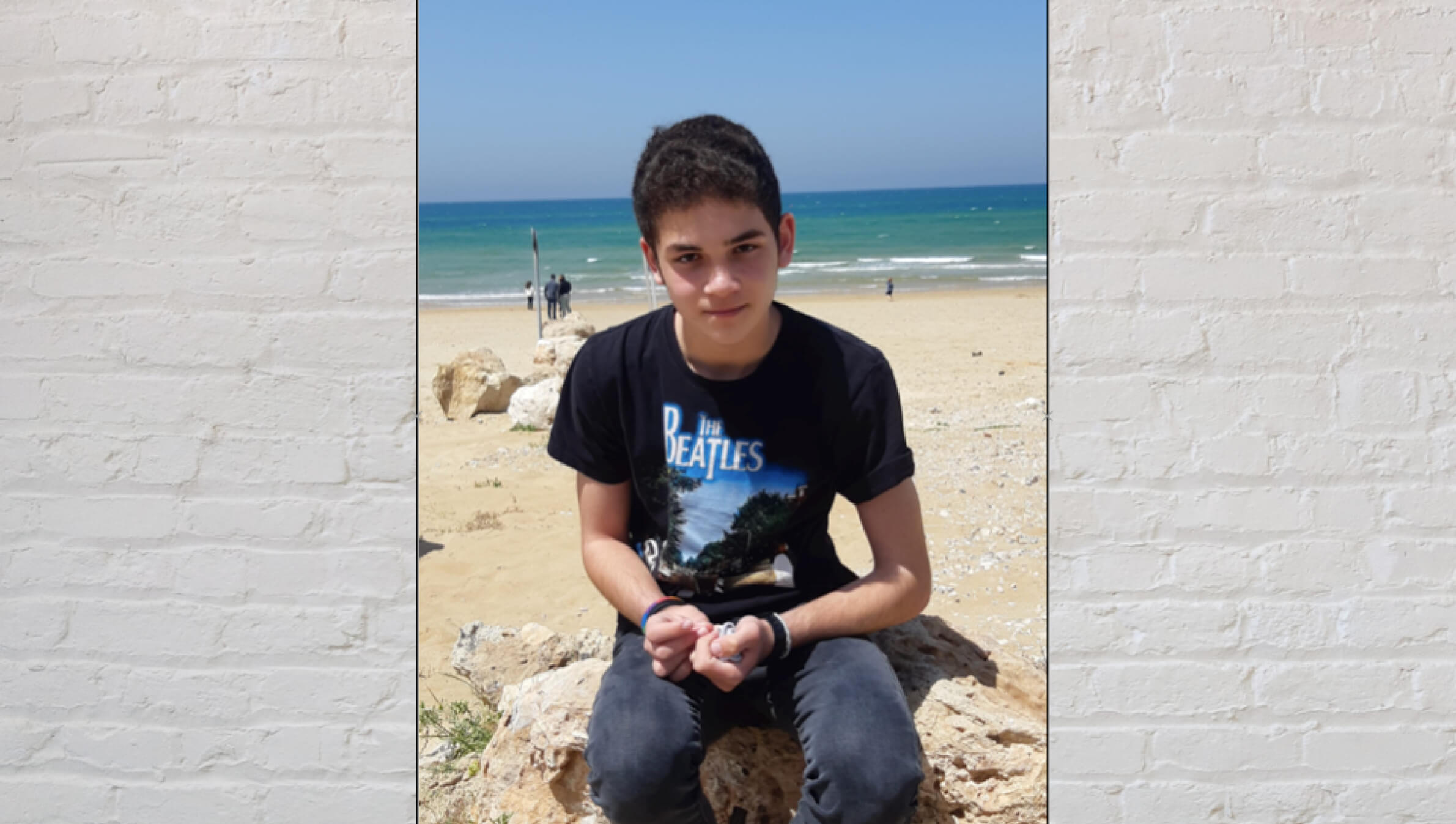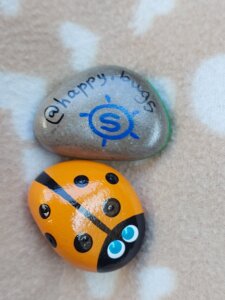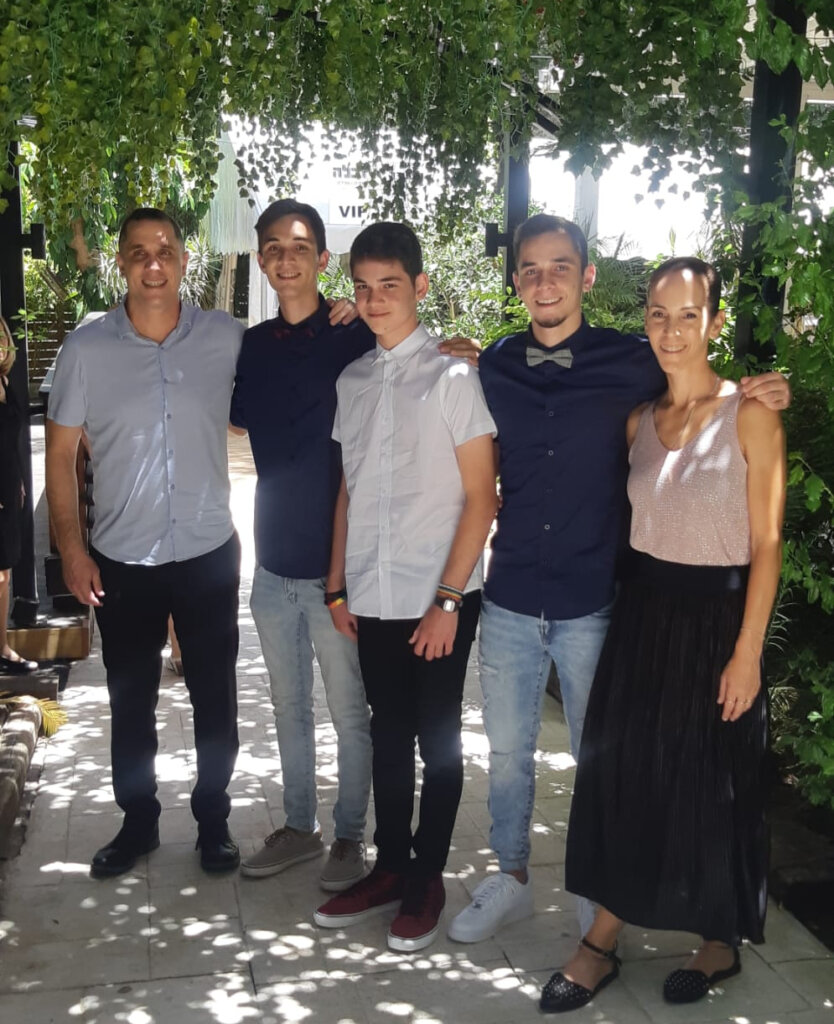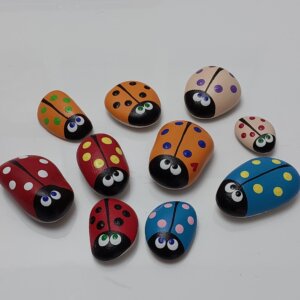A 13-year-old died by suicide. His mother borrows from a Jewish mourning ritual to save the lives of strangers.
With painted stones and an Instagram account, Anat Feldman sends messages of hope far from her home in Israel

Shahak Feldman in 2021. Courtesy of Feldman family
HAIFA, Israel — Shortly after her 13-year-old son Shahak’s death by suicide, Anat Feldman’s family, following a Jewish tradition, began collecting smooth stones to leave at his grave.

Then she began to paint the stones into vividly colorful ladybugs — because Shahak loved The Beatles, and a ladybug is a type of beetle.
At her kitchen table, Feldman has transformed about 100 stones into googly-eyed ladybugs which she, family and friends have left along walking paths and other places where people are likely to pick them up, in Israel and abroad.
On each of the ladybugs’ underbellies, she has painted a sun with an “S” at the center, for “Shahak.” Its five rays represent each member of the family: the son she lost, his two older brothers and her and her husband Doron.
She also marks the bugs with an Instagram address — @happy.bugs. There, she posts pictures of Shahak, symbols of his passions and messages she writes using a Hebrew font Shahak created from his own handwriting. She hopes these postings raise suicide awareness.
“I wouldn’t say it gives meaning to his death, but if we can keep one family from the horror we experienced, that would be important,” she said.
Shahak died on Oct. 11, 2021, not long after his bar mitzvah. He was, as Anat put it, 13 years, three months and 13 days old.

Approximately 100 Israelis under age 24 commit suicide annually, and they’ve been getting younger, said Shiri Daniels, national director of counseling at Eran, an Israeli organization whose acronym stands for Emotional First Aid.
“We’re seeing the ages decreasing: 11, 12, 13, 14,” Daniels said. “The situation is concerning.”
‘We didn’t see it’
Shahak dreamed of working as a film director. He also loved photography, Star Wars and music, and had taught himself to play drums and guitar. He never made it to his first lesson with the drum teacher he and his parents had met with on a Friday. The following Monday, Shahak visited his maternal grandparents for lunch, then walked to his paternal grandmother’s high-rise apartment building and jumped to his death.
He and a girlfriend had recently broken up, and a mutual friend told him that reconciling would not be possible. His parents said they think that contributed to Shahak’s decision to take his life.
“He was unhappy. But to go from that to suicide — no, we didn’t see it,” said Feldman, a pharmacist like her husband.
She wants the Instagram account to reach people in crisis and those who love them, before it is too late.
She asked in recent posts: “Do you recognize suicide’s warning signs?” and “What do you do when you come across a suicide note on-line?”
And she wrote: “Myth: If we speak about suicide, we’ll put thoughts into the person’s head, and the danger of suicide will increase.”
 The ladybugs have landed throughout Israel, from the Golan Heights to Eilat, and thousands of miles away, in Canada, Greece, the Netherlands, India, Denmark and Thailand.
The ladybugs have landed throughout Israel, from the Golan Heights to Eilat, and thousands of miles away, in Canada, Greece, the Netherlands, India, Denmark and Thailand.
Last week, two ladybugs helped Feldman’s friend, Merav Arotchas, teach her classes of seventh- and eighth-graders about speaking up when they feel overwhelmed. On a field trip to a Jerusalem-area forest, the teacher had them leave the ladybugs for others to find, and told them that when they struggle, “there’s always an adult to approach to ask for help. Someone will always listen.”
A woman in Hadera wrote to Feldman in mid-April that the ladybug’s bright colors made her happy, but also shared her agony: “I know the impossible pain up-close, and have experienced it myself many times. What helps me endure is the belief that things will change, and nothing is forever.”
The playlist
The Feldmans keep Shahak’s memory alive through the ladybugs, and also through the music he loved.

In a bedroom meant for Shahak which he never lived in — he died a week before the family moved to their new home — his parents met with a reporter as Shahak’s playlist of Beatles songs sang out from his mother’s phone. She plays it often — doing housework or sitting at his desk.
It was hard not to hear echoes of their loss in every song: “In My Life,” “Hey Jude,” “Golden Slumbers,” “A Hard Day’s Night,” “Yesterday,” “All My Loving,” “Come Together” and “Help!”
The Feldmans said they don’t know if Shahak had a favorite Beatle or Beatles song. His father likes “Let It Be” best. It projects hope, he said.
“In any person’s life, and especially in our day-to-day lives,” he explained, “optimism is what we’re looking for — a ray of optimism in the dark cloud.”
Editor’s note: This story mentions suicide. If you or someone you know is in crisis or needs support, call or text the National Suicide Prevention Lifeline in the U.S. at 988.




















